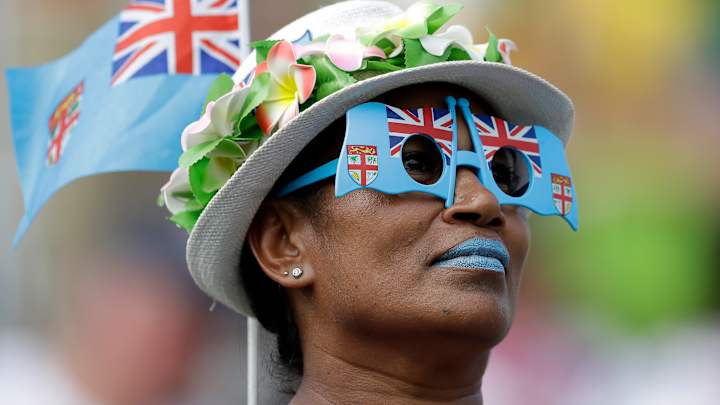Fijians demand Olympic gold for spiritual home of rugby 7s

RIO DE JANEIRO (AP) When rugby sevens was added to the Olympic program for Rio seven years ago, there was an almost instant clamor for gold in Fiji.
Finally, the people of the Pacific had a realistic chance of winning an Olympic medal. The pressure has intensified ever since, and so has the focus of the players.
''Fiji sevens and rugby - it's more than just a fanatical aspect of Fijian life,'' Fiji coach Ben Ryan said, ''It's in their DNA.''
Nobody flinched after Fiji beat New Zealand 12-7 in the quarterfinal on Wednesday, setting up a semifinal against Japan. The winner plays either South Africa or Great Britain for the gold.
Ryan laid out the team's sole aim for Rio - and it's not a modest one.
''We've got one aim and that's to win gold medal, not silver or bronze,'' he said. ''We're No. 1 in the world, we're not trying to be arrogant, we're saying this is what we want. Silver will be a disappointment as bronze and fourth place.''
The Fijians have long been the entertainers in sevens rugby, admired for their preference to run the ball from deep inside their own territory and waving the ball around with one hand looking for any chance to unload it with an unorthodox pass.
Some critics have questioned the Fijian players' ability to handle pressure, particularly at the Olympics where the entire population of the Pacific island nation will be watching or listening to every moment of every game.
Ryan said it's a mistake to think his team can't handle the extra attention that comes with being favorites at the Olympics.
He pointed out that the Fijians have won the Hong Kong Sevens title - the most prestigious on the calendar - more than any other nation. They've won the last two world series. He said they deal with pressure daily, more than any rugby sevens player in any part of the world.
''We're in the papers on the front and back pages - every night we're in the 6 o'clock news,'' he said. ''Everybody's a household name. The pressure is on them in our bubble in the Pacific every single day.
''That's not the same with any other team in this tournament, so they're used to it. They're not getting pressure they're not used to.''
Prime Minister Frank Bainimarama is in Rio for the games and, just like most Fijians, isn't averse to offering his opinion on matters to do with rugby.
''I did say to him `there are 12 teams here, there's only one with their head of state here,''' Ryan said, ''But he's a great supporter. I can talk to him about (tactics) and he'll give me some rugby knowledge. It's great. It's the people's team.''
Ryan was coaching England when the International Olympic Committee made the decision to bring rugby back on board for the first time since 1924, but changed the format to sevens - the faster, abbreviated version of the traditional 15-a-side game.
He moved to Fiji in 2013 and began honing the raw materials that already existed - big, fast men with an innate instinct for the game.
The biggest problem Ryan faced initially was the exodus of talented stars leaving with ever-greater frequency to make their livings abroad.
So he started putting together the nucleus of a squad around his captain Osea Kolinisau and planned to bolster it sometimes with returning players such as Josua ''the Fijian bus'' Tuisova, who is a star in the French competition.
Ryan describes Kolinisau as a role model and religious man who is the ''cultural architect'' of the team, and he has come to the fore at the most important moments in wins over Brazil, Argentina, the United States and New Zealand.
Kolinisau brings a reverence to the game which Ryan said he admires, and which is a big bond for the team in a deeply religious country.
''Spiritual is a really good way to sum up how the team operates,'' he said. ''The singing in the mornings, the signing in the evenings. The prayers.''
It's like there's two religions in Fiji, he said. On Sunday there's church and no sport, but every other day there's rugby.
